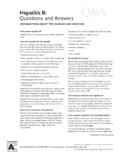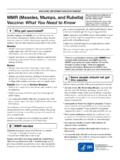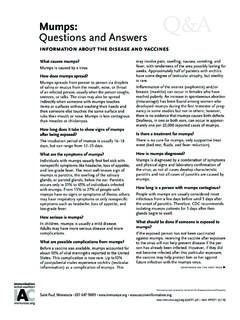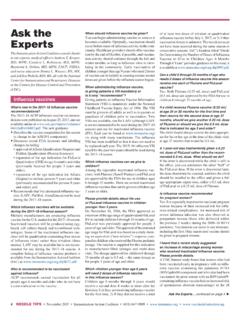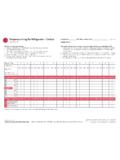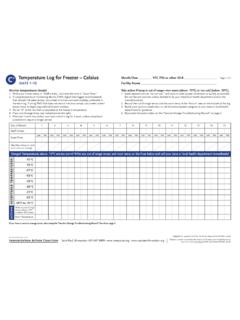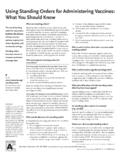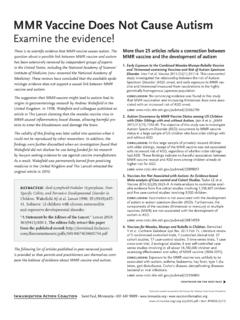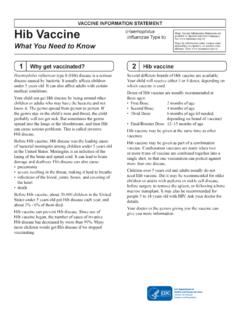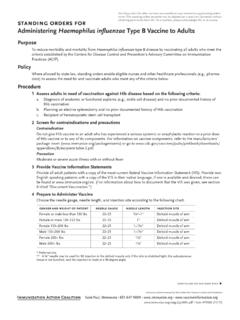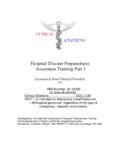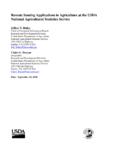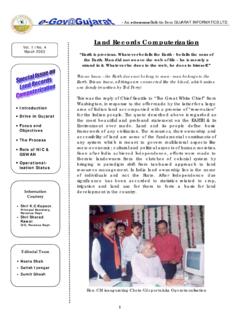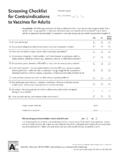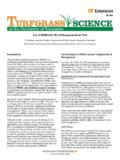Transcription of Screening Checklist patient name for …
1 Screening Checklist for Contraindications to Vaccines for Children and Teenspatient name date of birth / / month day yearyesnodon t knowTechnical content reviewed by the Centers for Disease Control and PreventionSaint Paul, Minnesota 651-6 47-9009 Item #P4060 (9/17)For parents/guardians: The following questions will help us determine which vaccines your child may be given today. If you answer yes to any question, it does not necessarily mean your child should not be vaccinated. It just means additional questions must be asked. If a question is not clear, please ask your healthcare provider to explain it.
2 1. Is the child sick today? 2. Does the child have allergies to medications, food, a vaccine component, or latex? 3. Has the child had a serious reaction to a vaccine in the past? 4. Has the child had a health problem with lung, heart, kidney or metabolic disease ( , diabetes), asthma, or a blood disorder? Is he/she on long-term aspirin therapy? 5. If the child to be vaccinated is 2 through 4 years of age, has a healthcare provider told you that the child had wheezing or asthma in the past 12 months? 6. If your child is a baby, have you ever been told he or she has had intussusception? 7. Has the child, a sibling, or a parent had a seizure; has the child had brain or other nervous system problems?
3 8. Does the child or a family member have cancer, leukemia, HIV/AIDS, or any other immune system problems? 9. In the past 3 months, has the child taken medications that affect the immune system such as prednisone, other steroids, or anticancer drugs; drugs for the treatment of rheumatoid arthritis, Crohn s disease, or psoriasis; or had radiation treatments? 10. In the past year, has the child received a transfusion of blood or blood products, or been given immune (gamma) globulin or an antiviral drug? 11. Is the child/teen pregnant or is there a chance she could become pregnant during the next month? 12. Has the child received vaccinations in the past 4 weeks?
4 Form completed by dateform reviewed by dateDid you bring your immunization record card with you? yes no It is important to have a personal record of your child s vaccinations. If you don t have one, ask the child s healthcare provider to give you one with all your child s vaccinations on it. Keep it in a safe place and bring it with you every time you seek medical care for your child. Your child will need this document to enter day care or school, for employment, or for international travel. 1.
5 Is the child sick today? [all vaccines] There is no evidence that acute illness reduces vaccine efficacy or increases vaccine adverse , 2 However, as a precaution with moderate or severe acute illness, all vaccines should be delayed until the illness has improved. Mild illnesses (such as otitis media, upper respiratory infections, and diarrhea) are NOT contraindications to vaccination. Do not withhold vaccination if a person is taking antibiotics. 2. Does the child have allergies to medications, food, a vaccine component, or latex? [all vaccines]An anaphylactic reaction to latex is a contraindication to vaccines that contain latex as a compo-nent or as part of the packaging ( , vial stoppers, prefilled syringe plungers, prefilled syringe caps).
6 If a person has anaphylaxis after eating gelatin, do not administer vaccines containing gel-atin. A local reaction to a prior vaccine dose or vaccine component, including latex, is not a con-traindication to a subsequent dose or vaccine containing that component. For information on vaccines supplied in vials or syringes containing latex, see reference 3; for an extensive list of vaccine components, see reference 4. People with egg allergy of any severity can receive any rec-ommended influenza vaccine ( , any IIV or RIV) that is otherwise appropriate for the patient s age. For people with a history of severe allergic reaction to egg involving any symptom other than hives ( , angioedema, respiratory distress), or who required epinephrine or another emer-gency medical intervention, the vaccine should be administered in a medical setting, such as a clinic, health department, or physician office.
7 Vaccine administration should be supervised by a healthcare provider who is able to recognize and manage severe allergic 3. Has the child had a serious reaction to a vaccine in the past? [all vaccines]History of anaphylactic reaction (see question 2) to a previous dose of vaccine or vaccine com-ponent is a contraindication for subsequent History of encephalopathy within 7 days following DTP/DTaP is a contraindication for further doses of pertussis-containing vaccine. Pre-cautions to DTaP (not Tdap) include the following: (a) seizure within 3 days of a dose, (b) pale or limp episode or collapse within 48 hours of a dose, (c) continuous crying for 3 or more hours within 48 hours of a dose, and (d) fever of 105 F (40 C) within 48 hours of a previous dose.
8 There are other adverse events that might have occurred following vaccination that constitute contraindications or precautions to future doses. Under normal circumstances, vaccines are deferred when a precaution is present. However, situations may arise when the benefit outweighs the risk ( , during a community pertussis outbreak). 4. Has the child had a health problem with lung, heart, kidney, or metabolic disease ( , diabetes), asthma, or a blood disorder? Is he/she on long-term aspirin therapy? [MMR, MMRV, LAIV]A history of thrombocytopenia or thrombocytopenic purpura is a precaution to MMR and MMRV vaccines. The safety of live, attenuated influenza vaccine (LAIV) in children and teens with lung, heart, kidney, or metabolic disease ( , diabetes), or a blood disorder has not been established.
9 These conditions, including asthma in children ages 5 years and older, should be con-sidered precautions for the use of LAIV. Children on long-term aspirin therapy should not be given LAIV; instead, they should be given IIV. 5. If the child to be vaccinated is 2 through 4 years of age, has a healthcare provider told you that the child had wheezing or asthma in the past 12 months? [LAIV]Children ages 2 through 4 years who have had a wheezing episode within the past 12 months should not be given LAIV. Instead, these children should be given IIV. 6. If your child is a baby, have you ever been told that he or she has had intussusception? [Rotavirus]Infants who have a history of intussusception ( , the telescoping of one portion of the intestine into another) should not be given rotavirus vaccine.
10 7. Has the child, a sibling, or a parent had a seizure; has the child had brain or other nervous system problem? [DTaP, Td, Tdap, IIV, LAIV, MMRV]DTaP and Tdap are contraindicated in children who have a history of encephalopathy within 7 days following DTP/DTaP. An unstable progressive neurologic problem is a precaution to the use of DTaP and Tdap. For children with stable neurologic disorders (including seizures) unrelated to vaccination, or for children with a family history of seizures, vaccinate as usual (exception: children with a personal or family [ , parent or sibling] history of seizures generally should not be vaccinated with MMRV; they should receive separate MMR and VAR vaccines). A history of Guillain-Barr syndrome (GBS) is a consideration with the following: 1) Td/Tdap: if GBS has Information for Healthcare Professionals about the Screening Checklist for Contraindications (Children and Teens)Are you interested in knowing why we included a certain question on the Screening Checklist ?
